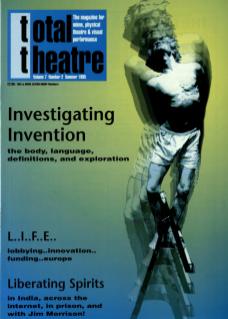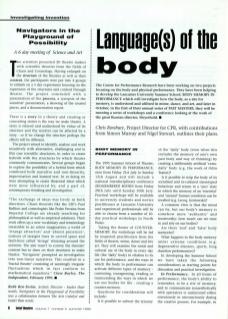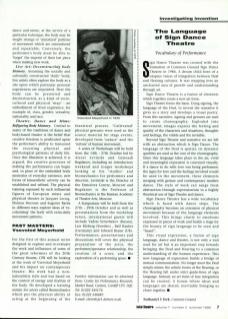Body Memory in Performance
The 1995 Summer School of Theatre, Body Memory in Performance, runs from Friday 21 July to Sunday 12 August and will include a national interdisciplinary conference (Remembered Bodies) from Friday 28 July until Sunday 30 July. Practical workshops will be available to university students and novice practitioners at Lancaster University, and experienced professionals will be able to choose from a number of ten-day practical workshops in North Wales.
Taking the theme of Counter-Memory, the workshops will be led by respected practitioners from the fields of theatre, mime, dance and live art. They will examine the social and cultural use of the body in everyday life (the daily body) in relation to its use for performance, and the ways in which the body in performance can activate different types of memory – contesting, transgressing, evading or transcending the ways in which we use our bodies for life – creating a counter-memory.
Questions for consideration will include:
Is it possible to subvert the tyranny of the ‘daily' body (even when this includes the memory of one's own past body and way of thinking) by creating a deliberately artificial 'extra-daily’ body (e.g. the work of Odin Teatret)?
Is it possible to strip the body of its socialised and in-cultured stereotyped behaviour and return to a 'zero' state in which the memory of an essential and 'natural' human condition can be recalled (e.g. Lecoq, Grotowski)?
A common view is that the mind can lie, but our body's memory is somehow more ‘authentic' and trustworthy: how much can we trust in and rely on our bodies?
Are there 'real' and 'false' body memories?
What happens to the body memory under extreme conditions (e.g. degenerative diseases, sports, long duration performances)?
In developing the Summer School we have taken the following considerations as starting points for discussion and practical investigation.
In Performance – In all forms of performance, the body's ability to remember, to be a site of memory, and to communicate synaesthetically with spectators is summoned either consciously or unconsciously during the creative process. For example, in dance and mime, at the service of a particular technique, the body may be taught strange or 'unnatural’ patterns of movement which are remembered and repeatable. Conversely, the performer's body must be able to 'forget' the imprint of their last piece when making new work.
Live Art: Deconstructing Body Memory – Assuming the socially and culturally constructed ‘daily' body, live artists often explore the body as a site upon which particular personal experiences are imprinted. Here the body can be presented and deconstructed, as a kind of sociocultural and physical 'map’ – an embodiment of lived experience, for example of, class, gender, sexuality, nationality and race.
Theatre, Dance and Mime: Refiguring Body Memory – Central to many of the traditions of dance and body-based theatre is the belief that creative freedom is predicated upon the performer's ability to transcend the recurring physical and psychological patterns of daily life. Once this liberation is achieved, it is argued, the creative processes of making the performance can begin and, in place of the embedded body memories of everyday existence, new forms of kinaesthetic activity can be established and refined. The physical training espoused by such influential figures of European mime and physical theatre as Jacques Lecoq, Étienne Decroux and Eugenio Barba in different ways explore ideas of 'recolonising' the body with extra-daily movement patterns.
Past Matters: Vsevolod Meyerhold
For the first of this annual series designed to explore and re-evaluate the work and influences of some of the great reformers of the 20th Century theatre, CPR will be looking at the work of Vsevolod Meyerhold and his impact on contemporary theatre. His work had a non-naturalistic style and was based on the control of energy and rhythm of the body. He developed a training system for actors called Biomechanics which put the physical ability of acting at the beginning of the theatrical process. ‘Cultivated’ physical gestures were used as the source material for stage events, developed from ‘nature’ and the ‘culture’ of human movement.
A series of Workshops will be held from 14-27 October led by Alexei Levinski and Gennadi Bogdanov, including an introductory weekend and longer workshops looking at his 'studies' and biomechanics for performers and directors. Leviniski is the Director of the Ermolova Centre, Moscow, and Bogdanov is the Professor of Biomechanics at the Russian Academy of Theatre Arts, Moscow.
A Symposium will be held from 27-29 October and as well as presentations from the workshop tutors, international guests will include Vadim Scherbakov (Russia), Lars Kleberg (Sweden), Ralf Rauker (Germany) and Edward Braun (UK). Performances, presentations and discussions will cover the physical preparation of the actor, the performer/spectator relationship, the creation of a score, and the exploration of a performing space.


